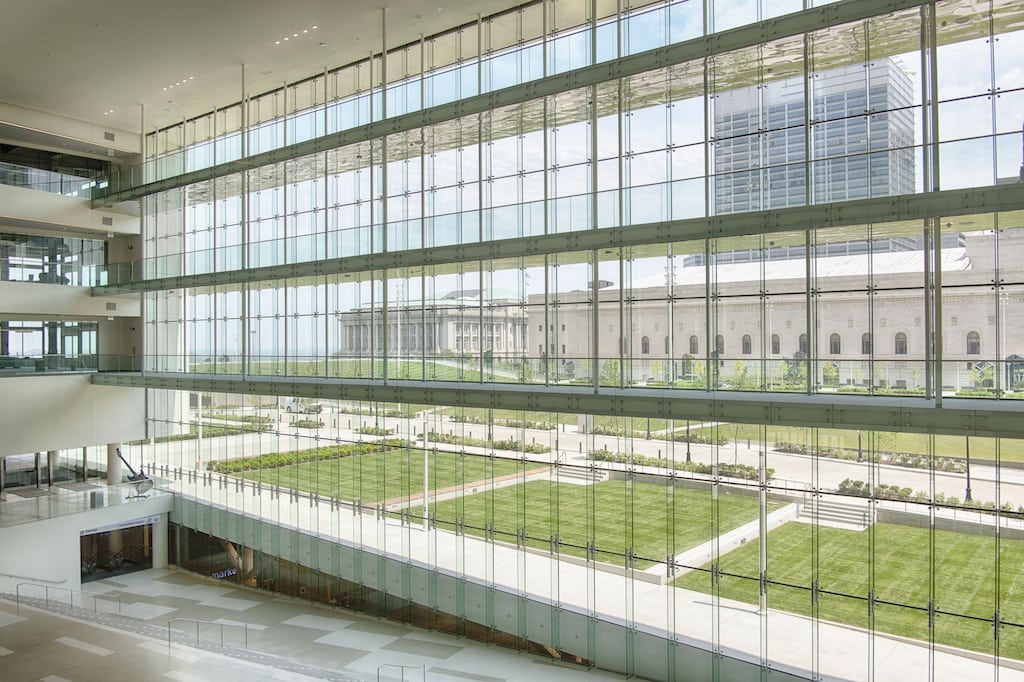Cleveland Carves Out a Clever Niche as Home to World Class Medical Meetings

Skift Take
The new Global Center for Health Innovation in Cleveland provides an exceptional example of how a second-tier city is competing for international medical meetings by tapping into its local industry expertise and knowledge economy.
It also shows how a building can transcend beyond a meeting space into a true innovation hub with educational and commercial applications to support professional development.
Cleveland has long been a magnet for medical meetings because it’s home to the Cleveland Clinic, which is basically a city within a city comprised of high-tech medical research facilities and healthcare providers.
The Clinic is also adjacent to Case Western Reserve University that’s home to its own highly ranked schools of medicine and medical engineering. The two institutions are co-developing the new Health Education Campus designed by London’s well-known Foster + Partners architecture firm.
Still, this is Cleveland. In Ohio.
Even though the city provides the infrastructure to compete with almost any medical campus in the world, the city lacks the cachet of other destinations with top research institutions like Boston, New York and San Francisco. That makes it challenging to attract many meeting planners who view Ohio as little more than a “flyover state.”
So Cleveland’s economic development agencies, including BioEnterprise, an accelerator focused exclusively on biomedical ventures, worked with the city council and local business stakeholders to see how they could disrupt the medical meetings sector.
The answer they came up with was quick and easy access to industry information and thought leaders. The strategy hinged on developing a macro network of micro networks, loosely based on the IT concept of interoperability where one system of information intuitively communicates with another.
If Cleveland could streamline the user experience for doctors, scientists, academics, and other healthcare-related attendees to share knowledge easily across multiple medical and scientific disciplines, that could be enough of a competitive advantage to drive incremental medical convention business to Cleveland.
With many high-profile medical meeting destinations, the local infrastructure is so entrenched with so many silos that it can be difficult to meet top people without having to go through a ton of channels.
“Doctors will ask me, ‘Can you give me a behind-the-scenes tour of the Cleveland Clinic?’” says Jake Orville, CEO of Cleveland HeartLab, a leader in cardiovascular risk assessment technology. “And I’ll say, ’Sure, of course.’ There are things that doctors want that they never ask for. I mean, if you go to Boston, who would you even ask for a behind-the-scenes tour of Harvard Partners or Brigham? Here it's just easy, and I can give you a hundred different analogies like that.”
Cleveland Clinic and the rest of the surrounding University Circle medical ecosystem are located 20 minutes away from the Cleveland Convention Center anchoring the heart of downtown Cleveland. If the city was going to give visiting medical convention attendees the kind of immediate and seamless connectivity to the medical sector that it wanted, it needed to bring the medical sector to the convention center.
Global Center for Health Innovation
The $465 million Global Center for Health Innovation opened next to the convention center in late 2013. The four-story building performs almost like a shopping mall with “suites” operated by Siemens, Cisco, Philips, GE Healthcare, SMG, Cleveland Clinic, BioEnterprise and others.
Each is designed to host small meetings for visitors specifically interested in these companies offering the latest advances in medical science, devices and IT.
At the Cisco suite, for example, there’s a TelePresence Room with a state-of-the-art videoconferencing system where visitors can engage with anyone at Cisco worldwide while sitting next to a Cisco representative.
“Folks from Cleveland Clinic or another medical organization might want to talk with our CEO or maybe someone from one of our business units, so the Global Center is perfect because we’re right here to facilitate that, and everyone else is here also,” says Christie Marquez, healthcare practice adviser at Cisco. “GE Healthcare and Siemens are big customers, and they’re also partners of ours. A lot of the spaces and tenants here are both customers and partners, so we're figuring out how to leverage those sorts of relationships.”
The space however works with anyone in any sector interested in Cisco products and services. The company is a leading supplier of smart city technology, for example, so people in town for conferences related to logistics, mobility, IT, transportation and many other fields might also find value in the Global Center.
“That's the power of this space,” says Marquez. “Yes, it sits in a healthcare building, but it’s flexible so you can have conversations about smart cities or manufacturing. Actually, that's one of the ways we got the higher ups to sign off on this thing. There's other verticals who might want to connect with us, so we designed this space so we could have those kinds of conversations.”
Over at the Cleveland Clinic suite, the light-filled space is basically a multimedia hub with dozens of models of health-tech devices and almost two dozen video installations to educate medical industry leaders about 21st-century healthcare.
“Cleveland Clinic has ranked number one in cardiac care in the country for the last two decades,” says Mary Curran, senior director of executive administration for the Cleveland Clinic Foundation. “One thing we can do is introduce companies to physicians, to researchers, to educators, and pull it all together in one space, and that is a benefit that you don’t get in Boston or San Francisco.”
Curran adds that the new Health Education Campus under development in partnership with Case Western is "being built from ground up to be the best learning environment for medical education in the country.”
Next Generation Knowledge
The entire top floor of the Global Center is occupied by the Healthcare Information & Management Systems Society (HIMSS). This is the nerve center of Cleveland's medical and healthcare economy and a portal into the global health industry.
HIMSS is a leader in medical IT that's attempting to answer the demand to develop a system that can collect and collate massive amounts of medical knowledge being produced everyday. In doing that, the nonprofit organization has built up an impressive database of companies that medical meeting planners can leverage.
"The Global Center is really a showroom for sharing knowledge where we can create very customized programming and content for medical meeting professionals," says John Paganini, senior manager of interoperability initiatives at HIMSS. "We do a lot of events here, because the networking opportunities of this building are unlike anything in healthcare. So planners can take advantage of that to expand their networks."
Arguably the most interesting tenant at the Global Center just moved in last month. The DHG Healthcare Center for Industry Transformation "provides industry leaders with the intelligence to serve and advance the delivery of care in a risk capable environment."
The space also offers two executive development sessions called the Innovation Acceleration Experience and Blue Sky Visioning. These are designed for any executive in any field, and they're helping drive the meetings industry trend to provide more holistic personal and professional education that spans all sectors. You can thank the Millennials for that.
Craig Anderson Sr., principle-in-charge of the DHG Healthcare Center for Industry Transformation, showed us a whiteboard with words written in two columns.
Under the title "Smart," the left column read: Strategy, Finance, Marketing, Technology.
The right column under the title "Health" read: Minimal politics, Minimal confusion, High morale, High productivity, Low turnover.
Anderson explained that next generation companies are shifting the conversation from attempting to be smart companies to becoming healthy companies because the latter is proving to be much more profitable. And, because this is the Global Center for Health Innovation, he says it only makes sense that this space helps direct that conversation.
"Everyone in the Global Center is part of trying to figure out how do we help the healthcare industry prepare for delivering quality care in an environment that is fundamentally going to change in the next three years," explained Anderson. "But a lot of what happens here is not industry specific. The wealth of the knowledge here is core knowledge about governance, healthy cultures and leadership, managing cost, technology, infrastructure. Certainly all of those things have healthcare applications, but the learning is really related virtually to any industry and any group."
Subscribe to the Skift MeetingsIQ newsletter for marketing, strategy and tech trends in the meetings and events sector.




